Breaking news
SNA 2017: Huntington Ingalls Industries Unveils Scale Model of DDG 51 Flight III Design.
| 2017
|
|
|||
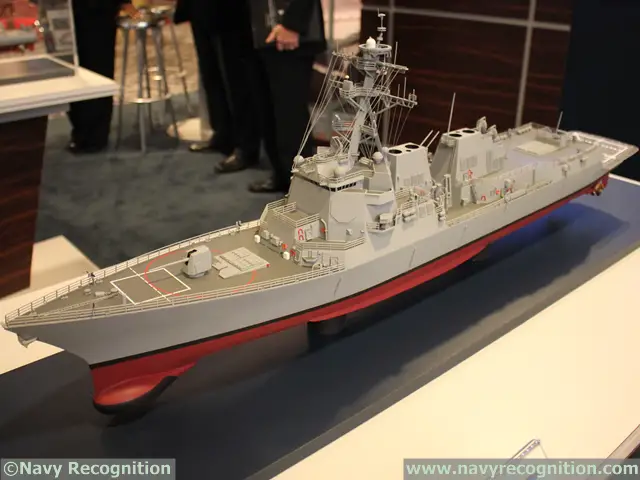 DDG 51 Flight III scale model on HII stand at SNA 2017 DDG 51 Flight III scale model on HII stand at SNA 2017 |
|||
|
|
|||
|
The DDG 51 Flight III will be the most advanced Arleigh Burke-class Destroyer in the US Navy fleet. According to HII, the Flight III design will provide the distributed lethality multi-mission capability of conducting anti-air warfare (AAW), anti-submarine warfare (ASW) and anti-surface warfare (ASuW). The new Flight III incorporates the SPY-6 Air and Missile Defense Radar (AMDR) giving it a true Integrated Air and Missile Defense (IAMD) capability.
|
|||
|
|
|||
|
Our video coverage on DDG 51 Flight III during SNA 2017
|
|||
|
|
|||
|
Talking to Navy Recognition, Perry Haymon, Manager – Advanced Concepts Group, HII-Ingalls Shipbuilding, explained "The model incorporates several features that are new to the Flight III. That includes the AMDR, the SPY-6, we've also changed the configuration of the RHIBs on the sides, added some habitability top side and increased the stern for added safety displacement. All these are design features the Navy is currently working on that we believe are going to be incorporated in the Flight III."
|
|||
|
|
|||
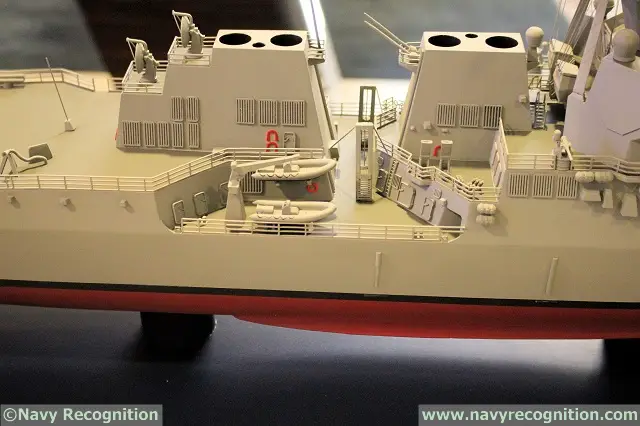 One of the few noticeable exterior design changes on DDG 51 Flight III: The RHIBs are stacked compared to... One of the few noticeable exterior design changes on DDG 51 Flight III: The RHIBs are stacked compared to... |
|||
|
|
|||
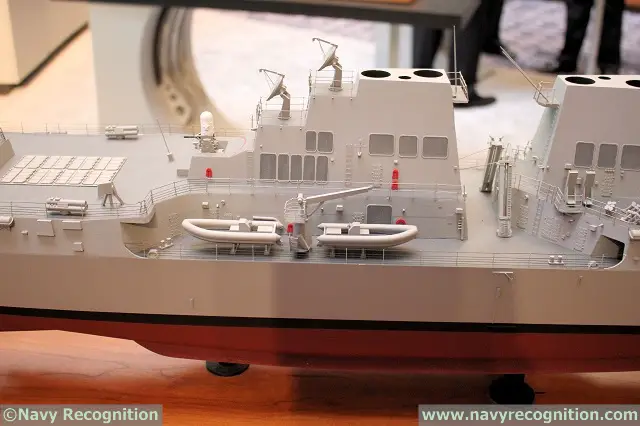 ... the same location on a DDG 51 Flight IIA ... the same location on a DDG 51 Flight IIA |
|||
|
|
|||
|
To support the new radar system, the electrical generators will be increased from 3.0 MW to 4.0 MW. The primary voltage will also be increased from 440 VAC to 4,160 VAC to support the increased power requirements.
According to HII, the DDG 51 Flight III will continue the tradition of being the most advanced multi-mission surface combatant in the world: Built for the US Navy, as the workhorse for AAW, fleet defense and now increased ballistic missile defense (BMD) capabilities. |
|||
|
|
|||
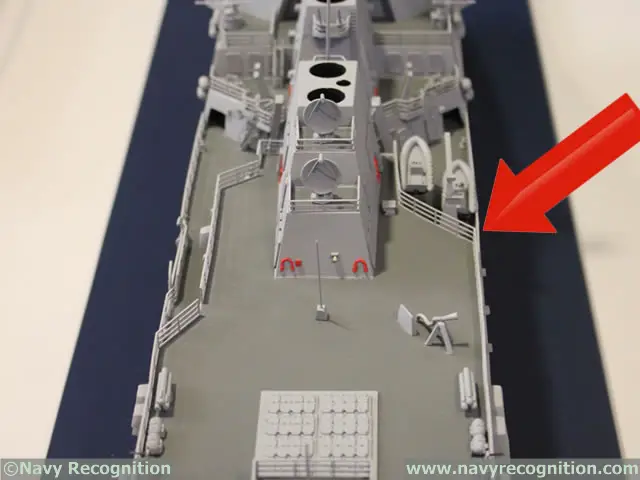 This area was enclosed to accomodate additional crew (more habitability) This area was enclosed to accomodate additional crew (more habitability) |
|||
|
|
|||
|
Based on a HII poster at the show, DDG 51 Flight III design changes include:
- Install Aegis upgrades - Install SPY-6 radar and supporting equipment - Modify deckhouse to accomodate radar size and weight - Arrange or relocate machinery to accomodate SPY-6 radar equipment - Modify electric system architecture to provide increased power to SPY-6 radar arrays - Install high-efficience air conditioning plants - Strengthen hull structure to increase ship's stability - Widen stern to increase ship's buoyancy - Enclose area near RHIBs to accomodate additional crew |
|||
|
|
|||
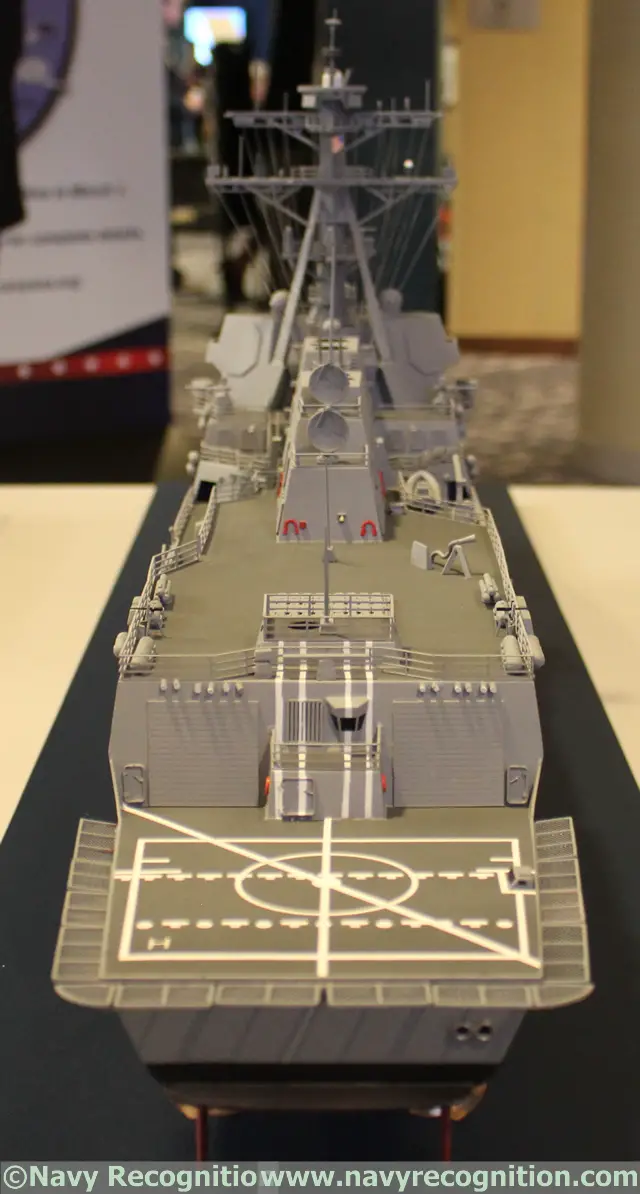 DDG 51 Flight III stern is widened to increase the ship's buoyancy (because the SPY-6 AMDR added some weight up high). The stern features the full load displacement enhancement system (FLODES) expanding the stern of the ship by 4 feet port side and starboard side above waterline. DDG 51 Flight III stern is widened to increase the ship's buoyancy (because the SPY-6 AMDR added some weight up high). The stern features the full load displacement enhancement system (FLODES) expanding the stern of the ship by 4 feet port side and starboard side above waterline. |
|||
|
|
|||
|
The first DDG 51 Flight III is set to be named the Harvey C. Barnum Jr. DDG 124 built by General Dynamics Bath Iron Works. It will be the 74th Arleigh Burke-class Destroyer overall. HII first Flight III configured ship is expected to be the Jack H. Lucas DDG 125. It will be the 35th Arleigh Burke-class destroyer to be built at Ingalls Shipbuilding in Pascagoula, Mississipi. Production is expected to start in May 2018.
DDG 51 Flight III characteristics Lenght: 510 feet Beam: 66.4 feet Displacement: 9,200 Tons Speed: 30+ Knots Crew: 314 Sensors: SPY-6 radar, SPQ-9B fire control radar, MK20 Mod 1 Electro-Optical Sensor System Weapons: Mk45 Mod 4 main gun, 96x Mk41 VLS cells, 2x Mk38 Mod 2 25mm RWS, 2x Mk32 triple torpedo launchers Decoys / EW: SEWIP Block 3, 4x Mk53 Nulka decoy launchers |
|||
|
|
|||
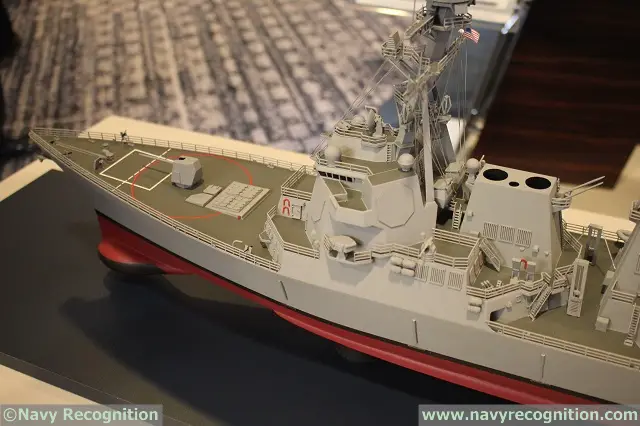 One of the main feature of DDG 51 Flight III design: The new SPY-6 Air and Missile Defense Radar (AMDR) by Raytheon. One of the main feature of DDG 51 Flight III design: The new SPY-6 Air and Missile Defense Radar (AMDR) by Raytheon. |
|||


























